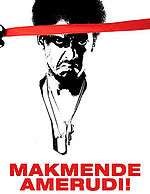Makmende
| Makmende | |
|---|---|
|
Ha-He video concept cover by Just A Band | |
| Genre | Super Hero |
| Country of origin | Kenya |
Makmende is a fictional Kenyan superhero character which has enjoyed a popular resurgence after an adoptation by Kenya's musical group Just A Band in the music video for their song Ha-He on their second album, 82 (2009). The video became the first viral internet sensation originating from Kenya.[1]
History
The word Makmende is a sheng (Swahili slang) word which means "a hero".[2] The name supposedly originated from a mispronunciation of a phrase spoken by Dirty Harry, played by Clint Eastwood, "Go ahead, make my day" (Mek ma nday) from the 1983 movie Sudden Impact. The word made its way into Kenyan streets in the 1990s whereby in the streets a bad-guy wannabe would be called out and asked "Who do you think you are? Makmende?". Anyone who thought they could do the impossible or a particularly difficult task was always asked whether they thought they were Makmende, since only Makmende could do or attempt to do the impossible. The character Makmende is associated with the fashion wear of the early 1980s. He is portrayed with long John Shaft-like afro hair and bell bottom trousers that were the trend then.
Resurgence

The video, directed by Jim Chuchu and Mbithi Masya, became a viral internet sensation and Kenyans launched an internet campaign for the "superhero" on Facebook, Twitter and other social media. The videos references blaxploitation and kung-fu movies in its style and features Makmende fighting with a variety of humorously named characters in a fictional city. The success of this video and the subsequent internet discussion has centered on the ways in which Kenyans were adopting social media. The cover graphic of the video has a black and white monotone portrait picture of Makmende placing a red head band across his forehead with the words MAKMENDE AMERUDI which is Swahili for MAKMENDE IS BACK. The role of Makmende on the video was played by graphics designer Kevin Maina, who had little previous acting experience.[3]
As of April 2010, the Makmende website was one of the most visited by Kenyan Internet users, and the meme had a quickly growing fanbase on Facebook and Twitter. The Makmende story has also featured on CNN[4] and was presented by CNN's David McKenzie. Makmende has also featured in articles in popular Kenyan media.[5]
Scholarly Discussion
The meme is discussed by Heather Ford in an ethnographic analysis of African contributions to Wikipedia, entitled The Missing Wikipedians.[6]
References
- ↑ Vinograd, Cassandra (March 24, 2010). "Kenya Launches Country’s First Viral Music Video". the wall street journal. Retrieved March 24, 2010.
- ↑ "Sheng-Kamusi". Sheng-Kamusi. 1997. Retrieved March 25, 2010.
- ↑ Daily Nation, March 27, 2010: There is a new hero in town, his name is Makmende!
- ↑ "CNN.com Video". CNN.
- ↑ http://www.nation.co.ke/News/Makmende%20wind%20sweeps%20the%20Internet%20/-/1056/886024/-/1dbat6/-/index.html
- ↑ http://hblog.org/writing/the-missing-wikipedians
External links
| Wikimedia Commons has media related to Makmende. |
